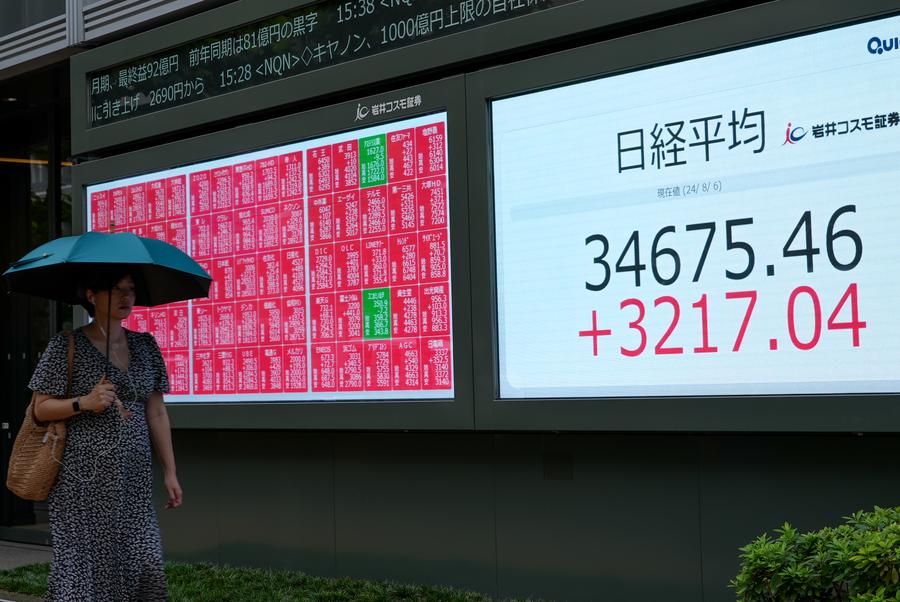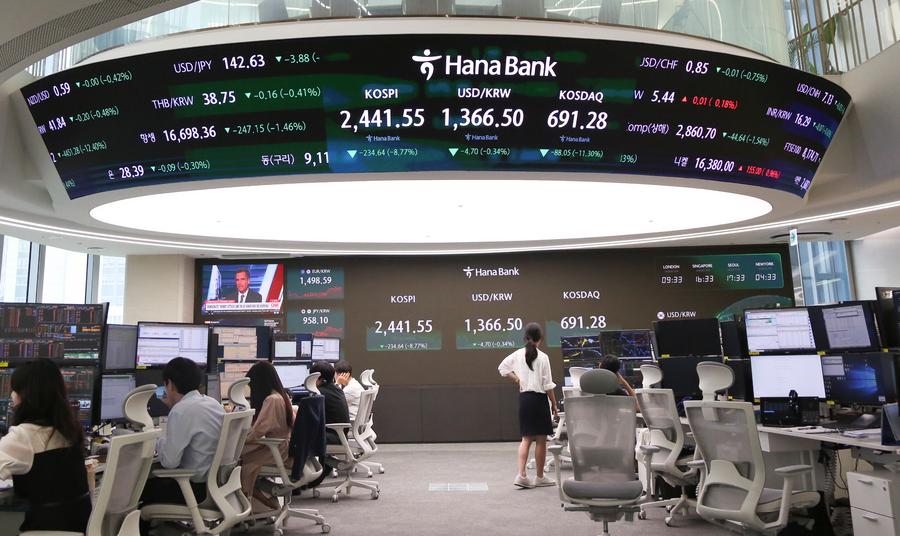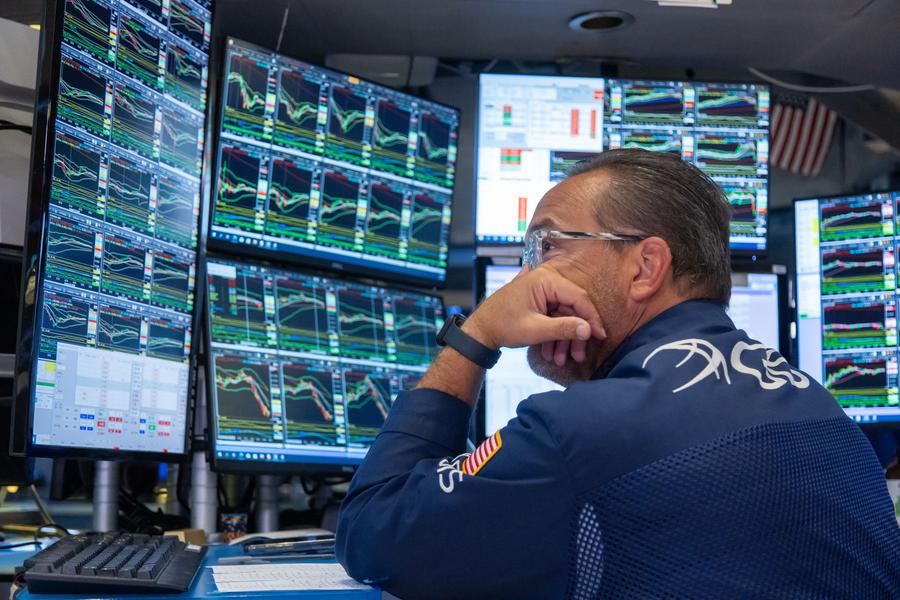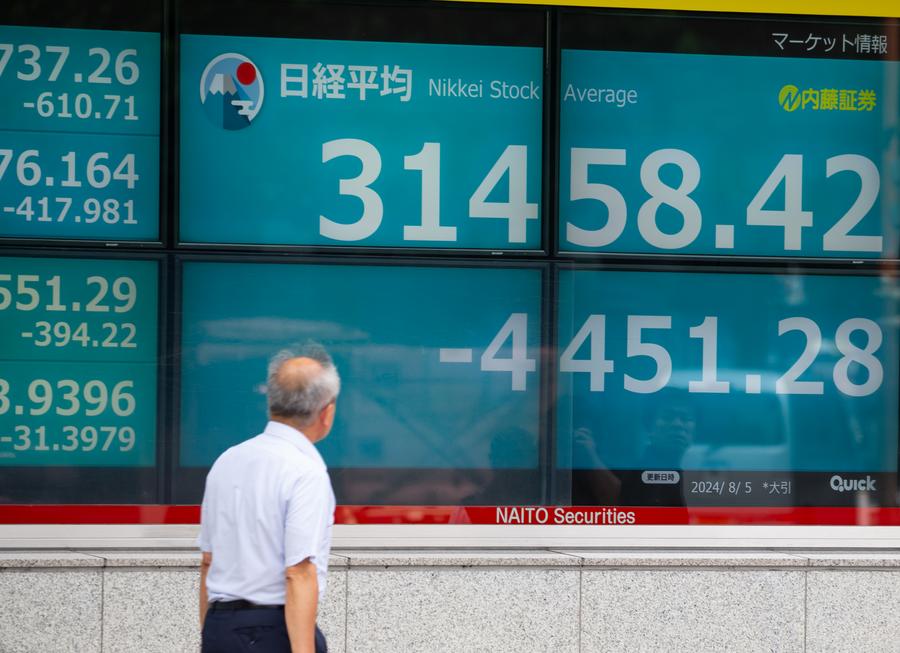Concerns grow as "Black Monday" hits global stock markets

A pedestrian passes a screen showing real-time stock market information in Tokyo, Japan, Aug. 6, 2024. (Xinhua/Yue Chenxing)
* The benchmark Nikkei lost 4,451.28 points to end the day at 31,458.42, its lowest level this year, surpassing its previous record intraday drop of 3,836 points seen during the "Black Monday" crash in 1987.
* The drop in the global market was mainly a result of the fear of economic recession following the recent release of a series of economic data in the United States, which have fallen short of expectations, analysts have noted.
* By continuously adjusting interest rates sharply, the United States has been reaping global wealth and shifting its own crisis onto others, leading to ongoing turbulence in international markets.
BEIJING, Aug. 6 (Xinhua) -- Treading on the heels of the collapse of Japan's benchmark Nikkei Stock Average, multiple stock indexes worldwide suffered severe losses on Monday.
In Asia, the circuit breaker was activated both in Japanese and South Korean markets during the day. Declines were also reported in various European markets. In the United States, all major stocks ended sharply lower, with both the S&P 500 and Nasdaq sinking to their lowest levels since May.
Analysts have said that the global market turmoil was mainly triggered by worrying figures from the United States, which fueled fears of a hard landing for the U.S. economy and undermined investor confidence worldwide.
BLACK MONDAY
Following a sharp drop on Friday, Tokyo stocks nosedived again on Monday. By the close of trading on Monday, the 225-issue Nikkei Stock Average fell by 12.40 percent, while the broader Topix index, also known as the Tokyo Stock Price Index, sank by 12.23 percent, wiping out all gains amassed earlier in the year.
The benchmark Nikkei lost 4,451.28 points to end the day at 31,458.42, its lowest level this year, surpassing its previous record intraday drop of 3,836 points seen during the "Black Monday" crash in 1987.
In South Korea, the benchmark Korea Composite Stock Price Index (KOSPI) dived 234.64 points, or 8.77 percent, to close at 2,441.55. A circuit breaker was activated on both the KOSPI and the small-cap KOSDAQ index to halt trading for 20 minutes on Monday afternoon, the first time since March 2020 that both indexes were halted in a single day.

Staff members work in front of the stock index information screen of Hana Bank in Seoul, South Korea, Aug. 5, 2024. (Xinhua/Yao Qilin)
In Europe, the Milan exchange's blue-chip index was 2.6 percent lower by the end of trading on Monday. The main index for the Frankfurt Stock Exchange in Germany and the Netherlands' Amsterdam Exchange each lost 2.1 percent. Spain's Madrid bourse lost 2.4 percent, while Paris stocks closed down by 1.4 percent. Outside the European Union, the London Stock Exchange slipped 2.0 percent.
U.S. stocks also ended sharply lower on Monday. The Nasdaq Composite Index shed 3.43 percent, while the Dow Jones and the S&P 500 fell by 2.6 percent and 3.0 percent, respectively.
RECESSION FEARS
The drop in the global market was mainly a result of the fear of economic recession following the recent release of a series of economic data in the United States, which have fallen short of expectations, analysts have noted.
According to data released by the U.S. Department of Labor on Friday, U.S. employers added only 114,000 jobs in July, raising unemployment to 4.3 percent and signaling continued cooling down of the labor market. Data published by the U.S. Department of Commerce on Friday also showed that new orders for manufactured goods in the country decreased by 3.3 percent month-on-month in June, marking the second consecutive monthly decrease.
The Institute for Supply Management announced on Thursday that its U.S. manufacturing index fell to 46.8 percent in July, significantly lower than June's reading of 48.5 percent. A reading below 50 represents contraction in the manufacturing sector.

A trader works on the trading floor of the New York Stock Exchange (NYSE) in New York, the United States, on Aug. 5, 2024. (Photo by Michael Nagle/Xinhua)
"The U.S. economy is a main driver for the global economy, and as worries of a slowdown mount, it puts global markets in turmoil," Greg McBride, chief analyst with Bankrate, told Xinhua.
"What we have seen is a recipe for volatility," McBride said, in reference to the news from the United States, as well as earnings reports and currency issues.
Economic concerns increased in light of the U.S. manufacturing PMI and employment data, as well as the questions about earnings of big tech companies, said Kang Jin-hyeok, an analyst at Shinhan Securities in South Korea.
The geopolitical instability in the Middle East also expanded the risk aversion, said Kang.
WHAT'S NEXT?
Following the dramatic drop on Monday, Tokyo stocks rebounded sharply on Tuesday, with the Nikkei Stock Average gaining over 10 percent during early trading, logging its largest-ever intraday gain.
Looking ahead, once the decline in global stock markets stabilizes and some panic subsides, the market is likely to quickly find its footing, and the probability of another "Black Monday" occurring in the short term is low.
From a medium to long-term perspective, once the Federal Reserve (Fed) starts cutting interest rates, central banks in many countries may also adopt more accommodative monetary policies, thereby increasing global capital liquidity. However, this does not guarantee that "Black Monday" will not reoccur.
The Fed ended its two-day policy meeting on July 31 and signaled a possible rate cut in September. As the negative effects of high interest rates on the U.S. economy continue to emerge, some economists worry that the Fed's move to cut rates too slowly could pose risks for the U.S. economy.
"This is a market tantrum," Priya Misra, a portfolio manager at JPMorgan, was quoted by the Financial Times as saying, referring to the global stock slide on Monday. "I think the market will continue to panic until the Fed shows signs of moving."
In March 2022, the Fed implemented aggressive interest rate hikes to combat inflation, resulting in severe negative spillover effects on the global economy and causing multiple rounds of significant devaluation of various currencies around the world.

A pedestrian passes a screen showing real-time stock market information in Tokyo, Japan, Aug. 5, 2024. (Xinhua/Yue Chenxing)
By continuously adjusting interest rates sharply, the United States has been reaping global wealth and shifting its own crisis onto others, leading to ongoing turbulence in international markets.
Against this backdrop, the severe declines in global stock markets on Monday mirror increasing concerns in the international market about the global economic outlook and escalating geopolitical conflicts, analysts have said.
Photos
Related Stories
- Hopes of stable stock market rise on H1 data
- Stock market may stabilize more on rules
- Major buybacks put spring back in A shares' step
- Rules for fair competition reviews fill legislative gap in China’s fair competition review system: SAMR
- Voices on China's financial market reform, opening up at Shanghai Lujiazui Forum
- China unveils new measures to deepen reform of STAR market
- Hong Kong stock exchange to stay open during severe weather
- Chinese stock exchanges test oversight standards of abnormal program trading: report
- Positive signs seen for A-share market
- Market mavens downplay volatility
Copyright © 2024 People's Daily Online. All Rights Reserved.









